My Friend Bud: An Interview with James Lee Burke On A. B. Guthrie

RR: I'm here with James Lee Burke, noted author of tons of books. I'm Russell Rowland, author of Fifty-Six Counties and a few other books, and we're going to talk about A. B. Guthrie, classic Montana author who won a Pulitzer Prize for The Way West and was also nominated for an Oscar for Shane, which is one of my favorite movies of all time. I am going to start by asking you, when did you first become aware of his work and what was it about it that spoke to you?
JLB: I'm glad you asked that question. It was in 1966. We moved out here to Missoula from Kentucky in order to teach, and we pulled in at the university, and we were really. Anyway, I noticed a tennis court and walked on over to hit on the backboard because we had been driving a long time. There was this man who was just flipping balls around, and he said, "well, let's play a game." And I said, "yeah, let's play." And then we played two or three games and I said, "Oh, I didn't introduce myself. My name's Jim Burke." And then he said, "Well, my name's Bud Guthrie." He was the first person I met when we arrived in Missoula.
RR: Wow. That's amazing.
JLB: That was it. And I didn't know who he was. I had never read any of his work.
RR: When did you discover his books?

JLB: Some time passed, and then another friend of mine—this was on a tennis court in Fort Lauderdale—started telling me about The Big Sky and The Way West. So somehow, to me, there's no way to deny metaphysical reality. There are just too many things that happen in a peculiar fashion, and it goes way beyond just luck. But that's how I met him and how I came to know his work. I dedicated one of my novels [House of the Rising Sun] to his memory and the memory of John Neihart, whom I knew quite well. He was my first poetry teacher at the University of Missouri back in the fifties. He was a great man. They were both great, and I think that without those two men, there would be no American West. They wrote about the West as it was.
RR: I'm curious because I just finished The Way West for the first time, and I agree with you that he was remarkable at capturing the West in a more realistic way. These are definitely men's stories mostly, but he captures the vulnerability and a lot more of the emotional landscape than a lot of the guys who write about the West do.
JLB: They are more like us than they are the replication of others. They (people in the past) were not different. They were just like us and, and most of them were brave, but they were also very frightened. It was like stepping off of a cliff. Reminds me of something Faulkner said. We read and see Shakespeare's work, not to discover what life was like in the 15th or 16th century, but to find ourselves in the heart of Shakespeare. We discover our own heart. That's what draws people into art.

RR: Shane is one of my favorite movies. I think a lot of the reason I love that movie is because it's a story that takes place in the West, but it could take place anywhere. The strength of it is the relationships between the characters. Do you share my admiration for that film?
JLB: Oh, it has no peer. It's an extraordinary film. And it became the guide for all what we would call Western movies, which it's not; it's not about the West, it's about humanity. It is the story of the search for the grail. It goes back to pre-Christian times, to Gaelic history. It's a man with no name who appears out with nowhere. But it also, it's the story of the Song of Roland.
RR: Another thing I loved about Shane was that he, and this is true of The Way West too, has a totally different approach to love triangles than a lot of westerns do. So, for instance, in Shane, Joe can tell that Shane is enamored with his wife, Marian, and that she feels the same, but instead of becoming defensive and threatening him, he has a conversation with her where he tells her if something happens to him, he would completely understand if she ended up getting together with Shane, which is pretty unusual for a Western from the fifties, very different from the usual macho I'm-going-to-get-even-with-that-guy kind of stuff, even though they entertain those thoughts. They show their humanity by going in a different direction, you know?
JLB: They are us.
RR: That's right. They're not the fictional version of Western men. Have you written quite a few books that are set in the Montana area?

JLB: Yes, quite a few. Even the Dave Robicheaux series goes up here. The third book won the Edgar—
RR: Black Cherry Blues. I love that book.
JLB: It allowed me to write full-time. I resigned the teaching job I had in Kansas, and we bought a house in Montana. Dave Robicheaux and Clete Purcel love to come out here too.
RR: I know Guthrie was unhappy with the film versions of Big Sky and The Way West, and for good reason. They're not very good. But have you had better experiences. I know you've had a couple of books made into films.
JLB: I've had four features, with various degrees of success. The most successful as a work of art is God's Country, which came out last year. It opened at Sundance, and Julian Higgins directed it. He's young, and an extremely good director. And he's done two adaptations of mine. And I had Heaven's Prisoners and In the Electric Mist, and a story of the Texas Revolution called Two for Texas.
I love movies and I love watching them, and I love the people who make them because it's an outdoor mental asylum. It's just great. Who needs LSD... Everyone in the industry virtually is neurotic. But when it's all over, they make something like Gone with the Wind and The Godfather. I'll never forget a line of Burt Reynolds’: Why grow up when you can make movies?
RR: Do you have any film interest now?
JLB: I've got quite a bit of film interest right now. I have four books coming out. I have a historical book that's coming out in July titled Flags on the Bayou. It takes place in 1863 in Louisiana. My last book, Every Cloak Rolled in Blood, deals with the Baker Massacre, but it's science fiction as well, and a memorial for our daughter. We lost our daughter, Pamala, two and a half years ago. We call it Pamala’s book. It's dedicated to her. It's my most powerful book.
RR: Is it non-fiction?
JLB: No, it's fiction, but my daughter's spirit is in it.
RR: Do you have any final thoughts, sir?
JLB: Mr. A.B. Guthrie was a very gentle and kind man, and he, he could not have been more humble. After I read his work, I taught it in university, and so my students would write to him. In fact, when we had our final, we cooked buffalo meat in the classroom.
RR: Oh, that's awesome.
JLB: That was our final, and we sent a card from the class to Bud, and he wrote us back. They really loved his work, and he took that as a great honor, and he was a man who had great honors. Bud was honored by our expression of respect for his work. You would think that he, of all people, would be aware of the amount of respect that other writers had for [the screenplay for Shane], because if you're a screenwriter, you cannot walk away from Shane. It's just incredible. The last scene, when Shane walks into the saloon... golly.
RR: Jack Palance.
JLB: Jack Palance is really a scary guy. He's sitting there with a dead stub of a cigarette in his mouth, roll your own. And that coffee that he's been drinking through two hours; he never drinks alcohol because he's a killer. Shane walks in and says, "I think you're a no-good damn Yankee liar." Jack Palance says, "I wouldn't push it, cowboy." And then suddenly the gun comes out of the holster, and Wilson is dead. He falls backwards and all these crates fall on his head. He's buried in three seconds. There's no falling out a window, no blood splatter.
RR: No glamor.
JLB: It's five seconds after his last threat. Pow, that's it. But then the little boy gets there with the dog. That is a sad film. That voice rolling, the way they put that echo on his calling out to him. The effect it has on me every time, it's like something is lost, but you don't know what it is because the war has been won. Some kind of hole that's there, and I still don't know what the hole is. But the little boy knows it.
RR: Thank you so much!
JLB: Take care, sir. Thank you.

Russell Rowland is the author of five novels, In Open Spaces, The Watershed Years, High and Inside, Arbuckle, and Cold Country. He also co-edited an anthology, West of 98: Living and Writing the New American West, with Lynn Stegner. And he published a book about his travels around Montana, Fifty-Six Counties: A Montana Journey, which is now also a radio show on his local NPR station. Rowland also hosts a podcast about Montana books, Breakfast in Montana. You can find his work here: russellrowland.com
Look out for an expanded version of this interview on Mr. Rowland's podcast "Breakfast in Montana" soon! Listen to that episode and others by visiting www.breakfastinmontana.com
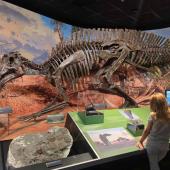
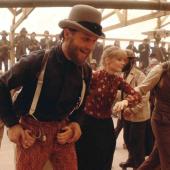
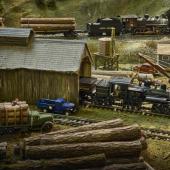
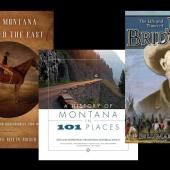
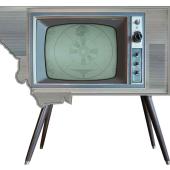

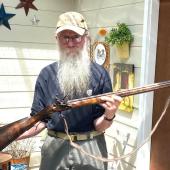
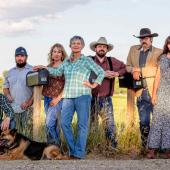
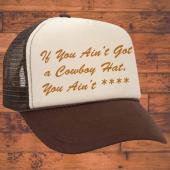
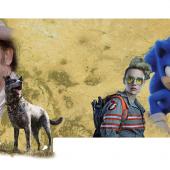
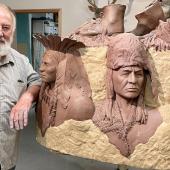
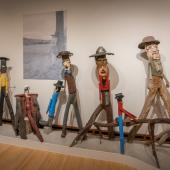
Leave a Comment Here